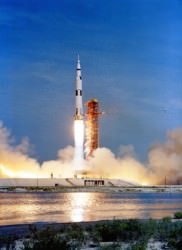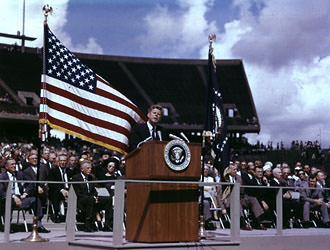“We set sail on this new sea because there is new knowledge to be gained, and new rights to be won, and they must be won and used for the progress of all people.”
– John F. Kennedy, September 12, 1962
On this day, 50 years ago, on a warm, sunny morning in Houston, Texas, President John F. Kennedy delivered a now-famous speech to 40,000 spectators at Rice University, a speech that supported the United States’s commitment to step beyond the boundaries of our world, to go beyond low-Earth orbit and eventually, successfully (and indeed before the decade was out!) land men on the Moon and return them safely to Earth.
It was an inspiring speech, both for the nation’s newly-developed space industry as well as for the entire country. (Would that we saw more overt dedication to space exploration from our leaders today!) This video from Rice University, itself celebrating its 100th anniversary in October, gives some insight into the events of that day in September of 1962, the small moments that led up to it and the large ones that followed.
From the Rice news release by Jade Boyd:
JFK’s 1962 moon speech still appeals 50 years later
Few moments in Rice’s history are as well known or oft remarked upon as the 1962 speech in which President John F. Kennedy boldly declared, “We choose to go to the moon!”
The speech marked a turning point for Rice, the city of Houston, the nation and the world. Globally, the space race played out against the backdrop of the Cold War, and in the U.S. the space program shared headlines with the Vietnam War and the struggle for civil rights. In Houston, NASA would pump more than $1 billion into the local economy in the 1960s and help the city blossom into the nation’s fourth-largest metropolis.
In a tribute to Apollo 11 astronaut Neil Armstrong this week, Rice alum Paul Burka ’63, executive editor of Texas Monthly magazine, published the verbatim text of Kennedy’s speech in his blog. Burka, who was at Rice Stadium that day, said the speech “speaks to the way Americans viewed the future in those days. It is a great speech, one that encapsulates all of recorded history and seeks to set it in the history of our own time. Unlike today’s politicians, Kennedy spoke to our best impulses as a nation, not our worst.”
Kennedy spoke at the stadium at 10 a.m. Sept. 12. It was a warm, sunny day, and fall classes were not yet under way. Rice’s incoming freshmen were on campus for orientation, but many of the estimated 40,000 spectators were Houston school children, said Rice Centennial Historian Melissa Kean.
Kennedy told the audience that the United States intended to take the lead in spaceflight, both to ensure that the Soviet Union did not base strategic weapons in space and because space exploration “is one of the great adventures of all time, and no nation which expects to be the leader of other nations can expect to stay behind in the race for space.”
The best-known line from the speech — “We choose to go to the moon!” — earned a thunderous ovation, in part because of Kennedy’s clever oratory. He played to the hometown crowd with the preceding line, “Why does Rice play Texas?” — a line that Kennedy jotted between the lines of the typed copy prepared by White House aide Ted Sorensen.
In its front-page coverage of the speech, the Rice Thresher made note of this line and others. The paper reported that the speech capped a two-day visit to Houston in which Kennedy toured facilities at the Manned Spacecraft Center (now Johnson Space Center), and the Thresher referred to the costly nature of the space program by citing the $5.4 billion annual NASA budget, a figure Kennedy also used in the speech.
The number impressed chemist Robert Curl ’54, one of many faculty members at the stadium.
 “I came away in wonder that he was seriously proposing this,” said Curl, Rice’s Pitzer-Schlumberger Professor Emeritus of Natural Sciences and professor emeritus of chemistry. “It seemed like an enormous amount of money to spend on an exploration program. It was an impressive amount of money back then, and if you adjust for inflation, the Apollo program cost more than the LHC today.”
“I came away in wonder that he was seriously proposing this,” said Curl, Rice’s Pitzer-Schlumberger Professor Emeritus of Natural Sciences and professor emeritus of chemistry. “It seemed like an enormous amount of money to spend on an exploration program. It was an impressive amount of money back then, and if you adjust for inflation, the Apollo program cost more than the LHC today.”
Curl said Kennedy’s vision paid off for NASA and Houston when Apollo 11 landed on the moon less than eight years later.
Another Rice faculty member in attendance was Ron Sass, fellow in global climate change at Rice’s Baker Institute for Public Policy and the Harry C. and Olga K. Wiess Professor Emeritus of Natural Sciences.
Sass and Curl each said Kennedy’s speech seemed no more remarkable at the time than the 1960 speech by President Eisenhower at Autry Court. Today, Eisenhower’s speech is largely forgotten, and Kennedy’s is still frequently cited in the news.
Sass said part of the enduring appeal of Kennedy’s speech is the magnitude of what he proposed, something Sass said he has come to appreciate more with age.
“It didn’t seem outlandish to me at the time,” Sass said. “I was young, and I thought you could do just about anything.”
“If this capsule history of our progress teaches us anything, it is that man, in his quest for knowledge and progress, is determined and cannot be deterred. The exploration of space will go ahead, whether we join in it or not, and it is one of the great adventures of all time, and no nation which expects to be the leader of other nations can expect to stay behind in the race for space.”
– President John F. Kennedy
For a full transcript of JFK’s speech, click here.
Video and inset image: Rice University. Apollo 11 liftoff: NASA


And today we can choose to go to Twitter. 😀
That must be one of “the other things” JFK meant.
Ironically, as so often highlighted, those cell phones used to twitter have more computing power than the Apollo missions required.
Thanks to microchips, created for….Apollo
Not to pick nits, but Kennedy’s speech that committed the United States to land men on the Moon and return them
safely to Earth was made more than a year earlier, on May 25, 1961, in his “Urgent National Needs” speech before Congress. The 1962 Rice University speech was a dramatic follow-up speech, in which he reiterated the national commitment that had already been made. By that time, the contract for the Apollo spacecraft had already been issued.
Read more: http://www.universetoday.com/97329/50-years-ago-today-we-chose-to-go-to-the-moon/#ixzz26HgQdKer
True. Edited to not appear to claim otherwise. 🙂
I remember seeing it reported on the news. At the time it seemed a perfectly logical progression of the way things were going and in the 1970s men would land on Mars but now we realise what an unsustainable wing and a prayer those men travelled on.
I see The Dawn mission as the pathfinder for phase 2. Working beyond the moon using ion drive it shows the feasibility of exploiting the resources in the asteroids, important because the two great motivations for exploration were always military supremacy and the prospect of getting astronomically rich. The cold war is over so bring on the greed.
Unsustainable is right. Strapping guys to the top of an ICBM is neither safe, nor economic, nor easy. The Bell X program that set so many of the early altitude and speed records was the Air Force program to get to space much more easily and reliably.
But, for some fairly understandable if regrettable reasons, President Kennedy wanted us to go RIGHT NOW, in effect. The result is that we’re STILL strapping people and cargo to the tops of ICBMs, and the Virgin Galactic/Bell X model is still many months or years from actually getting to space.
This should have been your lead story rather than yet another about the bloody useless shuttle. It’s still far more inspiring than constantly regurgitated stories about a flying brick that never even came close to living up to its billing i.e. 100 flights per year per vehicle when it managed a total of 135 in 30 years. We need more visionaries like Kennedy. [yes I know he was merely a mouthpiece and most of the early space race was military driven].
The most striking element of this speech is its stirring power for the human spirit. In reviewing it I am also encouraged by the nearly passing comment: “That budget now stands at $5,400 million a year–a staggering sum, though somewhat less than we pay for cigarettes and cigars every year. ” This is the true statement of the cost of space exploration. It is less than many common activities that we take for granted. And this is the funding premise of the OpenLuna Foundation. This is why we know we can fund this. It is not an engineering problem, though there are aspects to sort out, it is a funding problem. (see link at the bottom of the article for the full text of the speech where I got the quote.